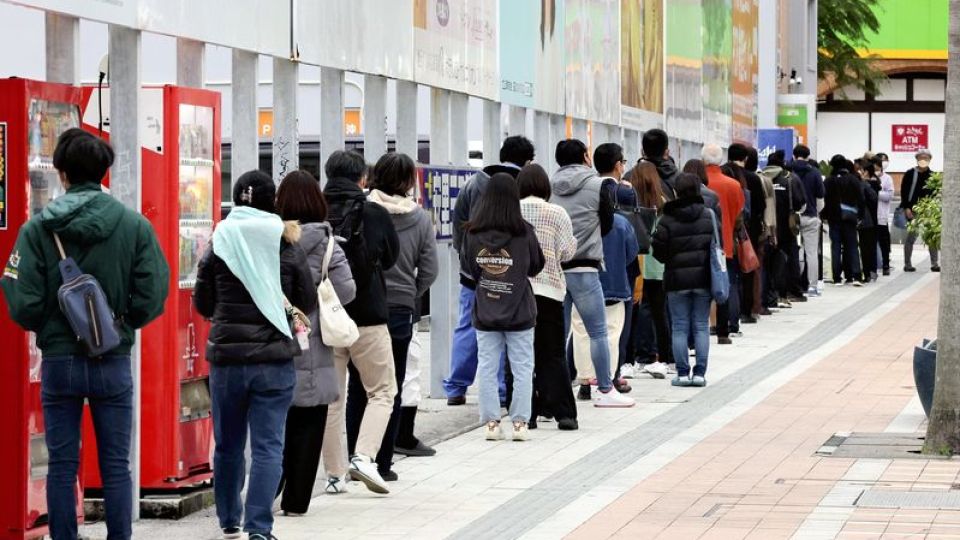January 19, 2022
TOKYO — Despite the ongoing spread of the omicron variant of the novel coronavirus in Okinawa Prefecture, citizens are unable to get tested quickly. The spread of the virus has kept essential workers who are either infected or were in close contact with infected people from coming to work, leaving the prefecture’s business and social activities in a precarious state.
■ Long line for testing
A long line forms every day in front of a PCR testing site operated by the private sector on Naha’s now uncharacteristically quiet Kokusai-dori street, where ordinarily bustling souvenir shops and restaurants remain shuttered.
“My son has been in close contact with infected people. But I haven’t been able to get him a publicly run test, so we came here,” said a 48-year-old company employee from Naha, standing in line with his 6-year-old son on Saturday.
An infection was confirmed on Jan. 11 at the Naha nursery school that his son attends, and the boy was deemed a close contact. However, the man was told by the nursery school that his son would have to wait about a week to get a publicly run test.
Half of the 10 employees at a call center where the man works are absent due to infections or being close contacts. Based on the company’s rules, the man cannot go to work unless his son tests negative. Although his son has no symptoms suggesting he is infected, the man said, “I’m worried that I don’t know if [my son] is infected and also that I can’t go to work.”
The prefectural government has set up a system to test up to 26,000 people a day, but it actually tests only about 20,000 a day due to a shortage of staff. The rapid increase in demand for free testing among the general public in Okinawa has caused delays in tests for people with high priority, such as close contacts.
■ Work on days off
The clogged testing system has worsened the shortage of essential workers.
Ten of about 50 staff members at an elderly care facility in central Okinawa Prefecture have missed work because of infection or being a close contact, worsening a labor shortage that was already serious due to a national entry ban on foreign technical interns.
The facility has managed to continue operating by reducing the bathing of users from daily to once every three days, as well as reducing meals from three to two a day while also maintaining nutrition.
The central government decided Friday to shorten the quarantine period for close contacts from 14 days to 10 days. It can be shortened further for essential workers if they have a negative PCR test result on the sixth day or a negative antigen test on the sixth and seventh days after close contact with an infected person.
The elderly facility sought PCR tests for its absent staff at first but couldn’t find any institution to accept the samples quickly. As a result, it bought 20 antigentesting kits instead on Monday.
“We will give the tests and have our staff come back to work as soon as possible,” the facility’s manager said.
Fire departments and nursery facilities are in the same situation.
At the Okinawa Tobu Fire Department, which covers the three towns of Yonabaru, Haebaru and Nishihara, nine out of 94 staff members are absent, keeping one of its six ambulances from being dispatched.
“Some members are on duty on their days off. We are on a tightrope,” a department official said.
Eight out of 21 hospitals that have been designated as priority institutions for COVID-19 treatment also are not accepting outpatients, and 40 of 246 nursery schools or kindergartens in Naha were closed as of Jan. 12 due to staff shortages.
■ Asking for help
A delivery service for about 9,000 COVID-19 patients at home is in a precarious situation, too.
The Haebaru social welfare council leaves daily necessities such as food and toilet paper at the entrance of patients’ homes for free. Four of its employees have missed work.
“We aren’t sure if we can maintain our operations if the number of absent staff keeps increasing at this rate,” said a 47-year-old council staff member in charge of food supply.
Truck drivers who deliver food and daily necessities have also been absent from work.
Boosting the number of tests is necessary to facilitate a return of close contacts to their workplaces. The prefectural government plans to ask labs outside the prefecture to conduct PCR tests, while encouraging business operators to use antigen test kits.Speech

